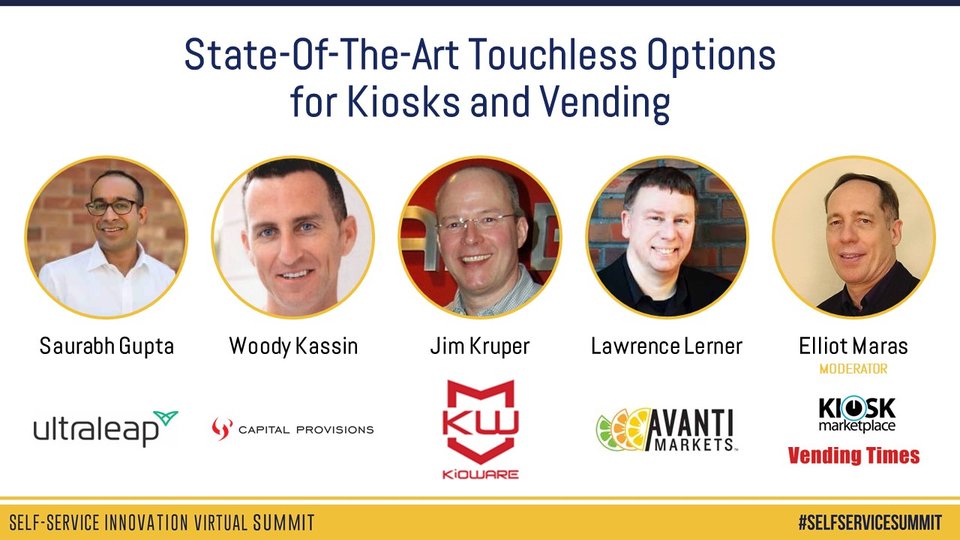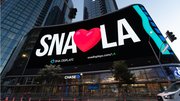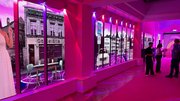Article
Touchless drives vending, kiosks, interactive signage
Companies and customers alike have demanded for more touchless options when it comes to vending and kiosks. Vendors have stepped up to the plate in a significant way to address this demand. Elliot Maras, editor of Kiosk Marketplace and Vending Times moderated a panel during the Self Service Innovation Summit that addressed this very topic.

December 22, 2020 by Bradley Cooper — Editor, ATM Marketplace & Food Truck Operator
Touchscreens in the past have been a dominate technology, but COVID-19 has significantly dented the public's demand and trust in touchscreens. Customers are naturally less disposed to interact with something that everyone has touched during a pandemic.
As a result, companies and customers alike have demanded more touchless options when it comes to vending and kiosks. Vendors have stepped up to the plate in a significant way to address this demand.
Elliot Maras, editor of Kiosk Marketplace and Vending Times, moderated a panel during the Self Service Innovation Summit entitled State-Of-The-Art Touchless Options for Kiosks and Vending that addressed this very topic.
The panelists, which included Saurabh Gupta, director of product, OOH, Ultraleap, Woody Kassin, CEO, Capital Provisions, Jim Kruper, president and co-founder, KioWare Kiosk System Software and Lawrence Lerner, head of product, Avanti Markets, addressed a variety of new touchless technologies that are helping kiosks and vending machines alleviate customer fears.
Touchless has been a major player for a while now, according to Kruper, simply because it offers a good customer experience and it is the way of the future, but sanitation practices have pushed it ahead.
"82% indicated in a survey that they found touchscreens unhygienic and would find touchless more hygenic," Gupta said.
"Touchless has always been important, but in this current environment, more important than normal," Kassin said.
Maras brought up that this trend actually began beforehand, when last year McDonald's touchscreens in the U.K. were found to be highly unhygienic.
Each company is addressing touchless in a different way. KioWare for example has launched its KioTouch, which provides QR code displayed on screen, which once scans, opens a browser mouse pad so users can control it touchlessly. After the transaction, the platform then guides customers to any landing website.
UltraLeap on the other hand has launched TouchFree, a code free solution, where users simply plug in a USB camera, which provides gesture control and transforms the customer's gestures into a cursor.
One big issue with these sort of touchless solutions is that it can be difficult to get customers to download a mobile app.
Kassin said that in more transient environments, such as airports, people are less likely to use touchless options, but in less transient places such as workplaces, the adoption rate is higher.
In addition, Kassin said that obviously younger audiences are more likely to adopt these technologies than other generations.
Lerner also said that it may simply be a matter of time for customers to get used to it. For example, ATMs used to seem strange, but now, "Most bank branches left are coffee shops."
Ultimately, the panelists agreed that this touchless trend will continue past COVID-19, and providers will learn to deliver solutions that overcome traditional pain points, such as unwillingness to download apps.
"We will evolve solutions to solve pain points," Gupta said.
Touchless will not just be by itself; it will become part of a larger ecosystem of solutions, such as voice, contactless, cryptocurrency and many others.
"The key as an industry is how we as an industry come together and stick these things together," Gupta said.
At the same time, certain technologies may have more trouble gaining traction such as facial recognition
"I think facial recognition is a no fly zone," Lerner said. "We are five years out from having government standards."
At the same time, Maras said that it seems that as long as most facial recognition companies give customers a way to opt into giving data, it can avoid problems. Because these trends are still developing, Kassin said this panel should be done again next year to see where we are at as an industry.
KioWare Kiosk System Software sponsored the session.
 ChatGPT
ChatGPT Grok
Grok Perplexity
Perplexity Claude
Claude






